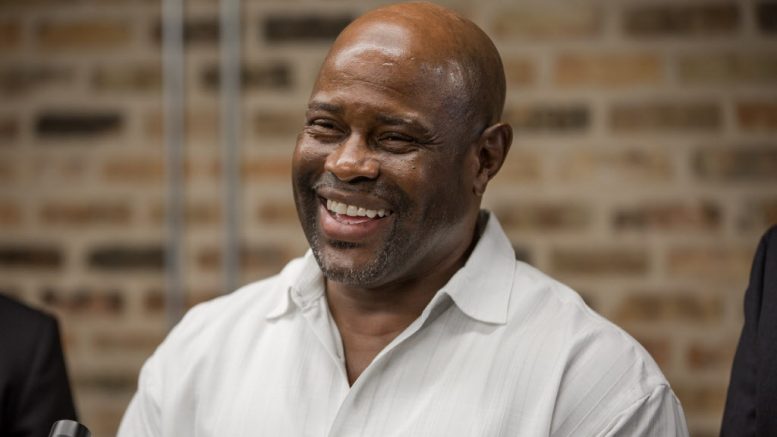On the day he came into a $15 million windfall, Rodell Sanders said he is considering a much-deserved vacation.
During 20 years behind bars for a murder he did not commit, Sanders studied the law and devoted himself tirelessly to overturning his conviction for the 1993 murder of Philip Atkins in Chicago Heights. On his way to successfully appealing his guilty verdict, Sanders told relatives not to visit him in prison, so he could focus on his case.
He continued working with his defense team after he won a new trial, and yet another retrial. In the two years since he was acquitted in 2014 at that third trial, Sanders has worked as a legal assistant at his lawyers’ firm.
On Wednesday, he settled a wrongful conviction lawsuit against the city of Chicago Heights — one of the largest wrongful conviction payouts in state history, his lawyer said.
“I do plan on taking a vacation,” said Sanders, 51, smiling sheepishly at a bank of cameras assembled for a press conference at the River North law offices of Loevy & Loevy.
“You do?” his lawyer, Russell Ainsworth quipped.
There still is litigation to come for Sanders: Chicago Heights’ insurance company is attempting to get out of paying the bulk of the settlement amount approved Wednesday by U.S. District Judge Amy St. Eve. Sanders said he intends to keep working at the firm, and the former high-ranking Gangster Disciples member said he is considering getting a law degree.
In a statement, Chicago Heights Mayor David A. Gonzalez said that the Sanders’ case took place 17 years before he was elected.
“The settlement, in which no wrongdoing has been assigned to the City of Chicago Heights Police Department, seeks to protect the interests of tax payers and to forge community unity in our diverse city,” Gonzalez said.
Ainsworth said there was no physical evidence linking Sanders to the shooting of Atkins and Atkins’ girlfriend, Stacy Armstrong, who survived after being shot and left for dead in an abandoned garage in Chicago Heights the night of Dec. 15, 1994.
Armstrong would later identify the short, stocky Sanders as the leader of a gang of four men who attacked her and Atkins, naming him as the one who ordered the shooting. But Armstrong had described the lead attacker as “tall and thin,” and Sanders is 5-foot-8 and 200 pounds.
Chicago Heights detectives built their case around Armstrong’s testimony and that of a snitch who claimed to have acted as a lookout during the shooting. But the snitch had cut a deal to shave time off his sentence and get cash payments in exchange for testifying against Sanders.
Sanders and other witnesses said Sanders was playing cards with friends at the time of the shooting.
The chief of police in Chicago Heights during the time Sanders’ case was being investigated was later convicted, along with six other Chicago Heights police officers, in a federal bribery and extortion case for charging protection money to a gang leader and using bogus police investigations to take out the gang’s competitors.
Sanders was sentenced to 80 years in prison, and he spent his years behind bars sending out Freedom of Information requests for information on his case and reviewing transcripts from his trial.
“I didn’t want to die in prison. I wanted to make it back out to my family, and I wanted to expose the Chicago Heights Police Department for exactly what they were,” Sanders said.
“I was saying from Day One that they framed me, and nobody would believe me, and now it’s finally come out. And today’s award of 15 million, they are clearly saying that they were wrong . . . with what they did to me, and I was right.”
Sanders acted as his own attorney, and his filings prompted a state Appeals Court to grant him a new trial. His 2013 retrial ended with a hung jury.
Despite having only a high school education, Sanders has proved to be a meticulous and insightful researcher for Loevy, Ainsworth said. While Loevy has handled dozens of wrongful conviction cases, Sanders is the first client the firm has ever hired, Ainsworth said.
“He has an incredible eye for detail,” Ainsworth said. “Whether it was his case or someone else’s, what he brings is that attention to detail. He reads every box on every police report.”
Sanders admits that he was “no angel” as a younger man, before his arrest for Atkins’ murder, but said he intends to continue to devote his time to helping other wrongfully convicted men win their freedom. He also has taken business classes, intends to invest his millions in real estate, and take a trip, possibly to Jamaica.
“I’m not the only millionaire that works here,” Sanders said. “There are millionaires here, and they still come to work every day, because they want to continue to help people like me.”
Source: chicago.suntimes.com





Be the first to comment on "Chicago Heights Pays $15M to Settle Wrongful Conviction Lawsuit"